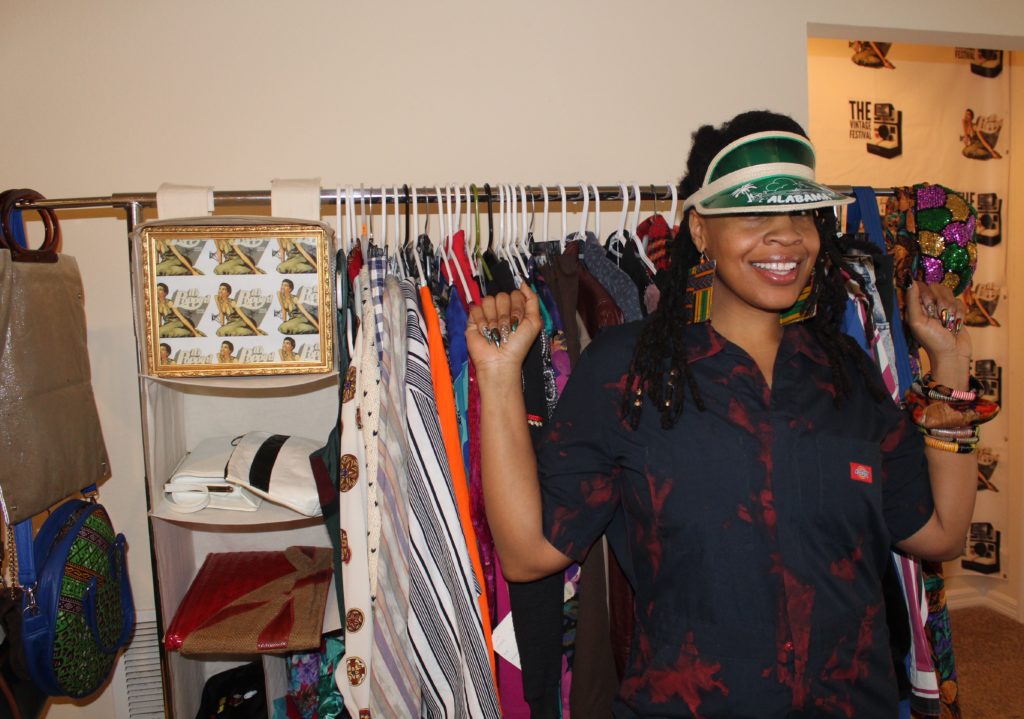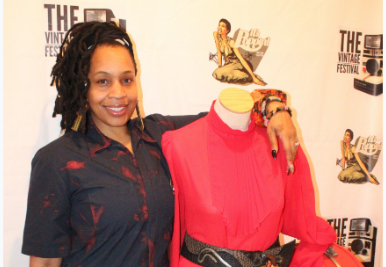By Ameera Steward
The Birmingham Times
Keisha Drammeh’s eye for history comes in handy, especially with her line of vintage clothing. Based on what she buys from thrift stores and estate and garage sales, she can always tell what was going on in the world when a certain item was in style. She researches the year and the era to make sure the attire is “authentically vintage.”
“There is a lot of copycat stuff out here,” she said. “You can look at zippers, buttons, and stitching to see if [an item] is truly vintage or not.
“Art is in everything, and fashion is an art form. So, anything I see can be used for fashion. I’ve always been taught to appreciate everything because you can see nature in it all. Patterns, fabrics, designs all have naturally occurring aesthetics [that] can be turned into artwork.”
It’s Poppin!

Drammeh creates artwork from used clothing she finds and recycles, and she sells those creations through her business, It’s Poppin! Vintage. Her “sustainable” vintage clothing store, which opened in 2014, features trendy, urban, vintage items while sustaining the environment and minimizing carbon footprints. She chose the name “It’s Poppin” because it’s long been one of her favorite phrases.
“I was saying that before it got trendy,” she said. “Now everybody is like ‘It’s poppin!’ It’s been poppin’ for me.”
A self-professed fashion activist, Drammeh doesn’t feel there’s a limit to what a person can wear, where they can wear it, and how they can wear it.
“I like gender-neutral items,” she said. “I’m not super-girly, but I’m not super-tomboy, [either]. I like to mix men’s pieces with women’s pieces. … There’s … no limit to fashion. It runs the gamut.”
In addition to telling the story of the clothes, she uses the word “sustainability” in what she does because “that’s what [my parents and I have] always done, being sustainable, … recycling and reusing, trying to reduce the amount of money [we would] spend on stuff,” she said.
Black History Month
February is a big month for Drammeh. On February 1 she was part of a fashion show presented by Golden Hour Productions and Unity Culture. And on March 16, she will host a re-grand opening at the Paisley Pig at 1904 2nd Ave. N.
“I hope I can be a part of that whole movement [to change fashion],” she said. “If it’s trendy to shop at a thrift store, please  be trendy. You’ll save so much money, and you’ll have your own unique look.”
be trendy. You’ll save so much money, and you’ll have your own unique look.”
Beyond fashion and business, Drammeh is part of the National Hook Up of Black Women, an organization that started in Chicago, “because this sister felt like black women didn’t have a place to meet or hook up and be resourceful with each other,” she said, adding that the group is resourceful to the point that they have become her team for whatever she needs when it comes to her programs.
Drammeh also has established an art and culture program. Because it’s Black History Month, the topic of discussion will likely be about Africa, and participants will make three-dimensional masks.
“The event is for kids,” she said. “It’s a [two-day] youth program … in conjunction with the Hook Up, … which is the type of organization that [will provide support for] whatever you want to do.”
“Spirit of Birmingham”
Drammeh, a 44-year-old mother of three, was born in Chicago, Ill. When she was 14, her family moved to Detroit, Mich., where they lived for the next 20 years. She then moved to Atlanta, Ga., where she lived until August 2018, when her husband received a better job opportunity that brought their family to Birmingham.
Drammeh loves the Magic City, but for her there’s no place like the Motor City.
“I love Detroit, and I see some similarities between Detroit and Birmingham,” she said. “I like the spirit of Birmingham. I’ve been able to connect with some really creative people here, and I like how the creative community is tight knit. It seems like a small, big city. I like that feel versus coming from a place that was on steroids.”
Artistic Beginnings
Drammeh was an only child, and her parents were activists.
“My parents always [bought black]. We’ve been buying black since I was little,” she said. “[We] lived a real African-centered lifestyle, so we put black before anything.”
Her mother was an account executive who sold commercial time for major television networks, and her father was an artist.
“[My dad was always] digging, … pulling up, and putting stuff in the back of the car that people were trying to throw away,” she said. “He didn’t believe in wasting.”
Drammeh’s family didn’t go to church, so Sundays were the creative days in their household.
“Jazz, Miles Davis playing. Painting. … Just doing stuff in the house. … That’s the type of vibe my parents were on,” she said. “Looking back on how I grew up, I think a lot of black people could have benefitted from coming from such an African-centered household. … I don’t think a lot of black families were having the type of conversations that took place in our home and letting their kids be part of them.”
Growing up in such a creative household helped Drammeh develop her own style—and not care what others thought about it.
“I was one of those kids putting graffiti on and holes in their clothes before [designers] started selling [clothes like that],” she said. “You know, that was tacky for some people, especially your parents. I feel like that [style] was kind of inspired by [my] generation.”
Growing up in the Motor City also influenced Drammeh’s sense of style.
“In Detroit, you’ve gotta be ready for whatever at all times,” she said. “I look at [rapper] Kash Doll, [singer, rapper, and songwriter] Dej Loaf, and other Detroit artists and say they are basically still Detroit girls.”
Community Work
 Drammeh earned a bachelor’s degrees in mortuary science and community development from Detroit’s Wayne State University, but she has always been an educator at heart.
Drammeh earned a bachelor’s degrees in mortuary science and community development from Detroit’s Wayne State University, but she has always been an educator at heart.
“I ended up in art education because I love art and I love community,” she said. “I’ve always worked with after-school programs and had my own after-school programs for youth.”
Drammeh has been in the education and youth-development fields for years, both with her own cultural art programs and with the Boys and Girls Club in Atlanta, where she served as the cultural art director. She left that job in 2014 to devote time to It’s Poppin! Vintage.
In Atlanta, Drammeh found several nice thrift stores, where she would often shop for her friends. She also would add fabrics or patchwork to pieces to create different looks.
“For my friends and myself, … if I saw something cute [at a thrift store], I would buy it because it was cheap,” she said. “One day, I woke up and realized I had about 50 pieces that I didn’t give away. I couldn’t fit [any of the items], so invited people over for a big sale at my house. After that, I just kept shopping, [and] I never stopped.”
Drammeh recalled the number of people who showed up to her sale, and she has since turned her hobby into a hustle. Most of her customers are people who like to thrift: women and some men between the ages of 24 and 50. She also has seen her customer base grow among the lesbian, gay, bisexual, transgender, and questioning and/or queer (LGBTQ) community.
Drammeh feels she offers her customers hope, as well as a sense of unorthodox style. The selections available at It’s Poppin! Vintage blends patterns, colors, and textures, but it’s about more than just selling clothes.
“It’s selling style, personality and character all in one,” she said, adding that her ultimate goal is to reduce the amount of money people spend on stuff.
“You spend money on a T-shirt that was made in a sweatshop by someone who was paid maybe 3 cents and can’t even feed their family. [Manufacturers] use gallons and gallons of water to make the cotton,” Drammeh said. “It’s just stupid when you can get something that has stood the test of time and is still great.”
When it comes to pricing, Drammeh doesn’t try to match other retailers. She takes a few things into consideration: her time, the clothing selection, and the era in which the clothing was made.
Visit www.itspoppinvintage.com to not only shop but also check out Drammeh’s blog, which includes the history of some her pieces.
-This article was updated on 2/7/2019 at 11:05 a.m. to correct that Drammeh’s shop was opened in 2014 and also to correct that her store will host a re-grand opening on March 16.




